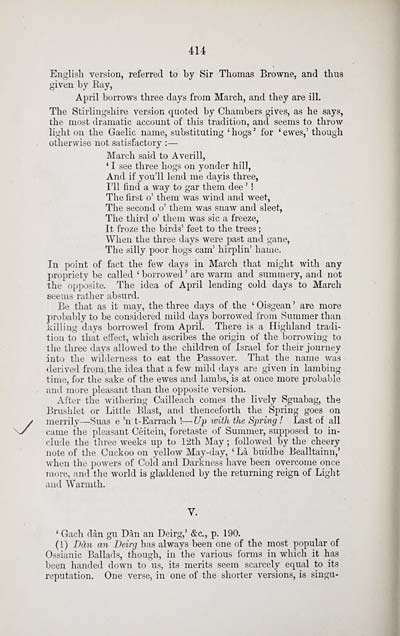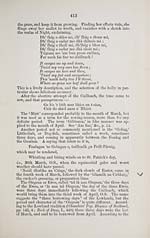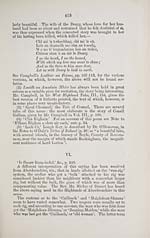Download files
Complete book:
Individual page:
Thumbnail gallery: Grid view | List view

y
414
English version, referred to by Sir Thomas Browne, and thus
given by Ray,
April borrows three days from March, and they are ill.
The Stirlingshire version quoted by Chambers gives, as he says,
the most dramatic account of this tradition, and seems to throw
light on the Gaelic name, substituting ' hogs ' for ' ewes,' though
otherwise not satisfactory : —
March said to Averill,
' I see three hogs on yonder hill.
And if you'll lend me dayis three,
I'll find a way to gar them dee ' !
The first o' ihem was wind and weet.
The second o' them was snaw and sleet,
The third o' them was sic a freeze,
It froze the birds' feet to the trees ;
When the three days were past and gane.
The silly poor hogs cam' hirplin' hame.
In point of fact the few days in March that might with any
propriety be called ' borrowed ' are warm and summery, and not
the opposite. The idea of April lending cold days to March
seems rather absurd.
Be that as it may, the three days of the ' Oisgean ' are more
probably to be considered mild days borrowed from Summer than
killing days borrowed from April. There is a Highland tradi-
tion to that effect, which ascribes the origin of the borrowing to
the three days allowed to the children of Israel for tlieir journey
into the wilderness to eat the Passover. That the name was
derived from the idea that a few mild days are given in lambing
time, for the sake of the ewes and lambs, is at once more probable
and more pleasant than the opposite version.
After the withering Cailleach comes the lively Sguabag, the
Brushlet or Little Blast, and thenceforth the Spring goes on
merrily— Suas e 'n t-Earrach !— U'p with the Spring ! Last of all
came tlie pleasant Ceitein, foretaste of Summer, supposed to in-
clude the three weeks up to 12th May ; followed by the cheery
note of the Cuckoo on yellow May-day, ' La buidhe Bealltainn,'
when the powers of Cold and Darkness have been overcome once
move, and the world is gladdened by the returning reign of Liglit
and Warmth.
V.
' Gach dan gu Dan an Deirg,' &c., p. 190.
(1) Dan an Deirg has always been one of the most popular of
Ossianic Ballads, though, in the various forms in which it has
been handed down to us, its merits seem scarcely equal to its
reputation. One verse, in one of the shorter versions, is singu-
414
English version, referred to by Sir Thomas Browne, and thus
given by Ray,
April borrows three days from March, and they are ill.
The Stirlingshire version quoted by Chambers gives, as he says,
the most dramatic account of this tradition, and seems to throw
light on the Gaelic name, substituting ' hogs ' for ' ewes,' though
otherwise not satisfactory : —
March said to Averill,
' I see three hogs on yonder hill.
And if you'll lend me dayis three,
I'll find a way to gar them dee ' !
The first o' ihem was wind and weet.
The second o' them was snaw and sleet,
The third o' them was sic a freeze,
It froze the birds' feet to the trees ;
When the three days were past and gane.
The silly poor hogs cam' hirplin' hame.
In point of fact the few days in March that might with any
propriety be called ' borrowed ' are warm and summery, and not
the opposite. The idea of April lending cold days to March
seems rather absurd.
Be that as it may, the three days of the ' Oisgean ' are more
probably to be considered mild days borrowed from Summer than
killing days borrowed from April. There is a Highland tradi-
tion to that effect, which ascribes the origin of the borrowing to
the three days allowed to the children of Israel for tlieir journey
into the wilderness to eat the Passover. That the name was
derived from the idea that a few mild days are given in lambing
time, for the sake of the ewes and lambs, is at once more probable
and more pleasant than the opposite version.
After the withering Cailleach comes the lively Sguabag, the
Brushlet or Little Blast, and thenceforth the Spring goes on
merrily— Suas e 'n t-Earrach !— U'p with the Spring ! Last of all
came tlie pleasant Ceitein, foretaste of Summer, supposed to in-
clude the three weeks up to 12th May ; followed by the cheery
note of the Cuckoo on yellow May-day, ' La buidhe Bealltainn,'
when the powers of Cold and Darkness have been overcome once
move, and the world is gladdened by the returning reign of Liglit
and Warmth.
V.
' Gach dan gu Dan an Deirg,' &c., p. 190.
(1) Dan an Deirg has always been one of the most popular of
Ossianic Ballads, though, in the various forms in which it has
been handed down to us, its merits seem scarcely equal to its
reputation. One verse, in one of the shorter versions, is singu-
Set display mode to: Large image | Transcription
Images and transcriptions on this page, including medium image downloads, may be used under the Creative Commons Attribution 4.0 International Licence unless otherwise stated. ![]()
| Early Gaelic Book Collections > Matheson Collection > Collection of Gaelic proverbs and familiar phrases > (454) |
|---|
| Permanent URL | https://digital.nls.uk/76564107 |
|---|
| Description | Items from a collection of 170 volumes relating to Gaelic matters. Mainly philological works in the Celtic and some non-Celtic languages. Some books extensively annotated by Angus Matheson, the first Professor of Celtic at Glasgow University. |
|---|
| Description | Selected items from five 'Special and Named Printed Collections'. Includes books in Gaelic and other Celtic languages, works about the Gaels, their languages, literature, culture and history. |
|---|

